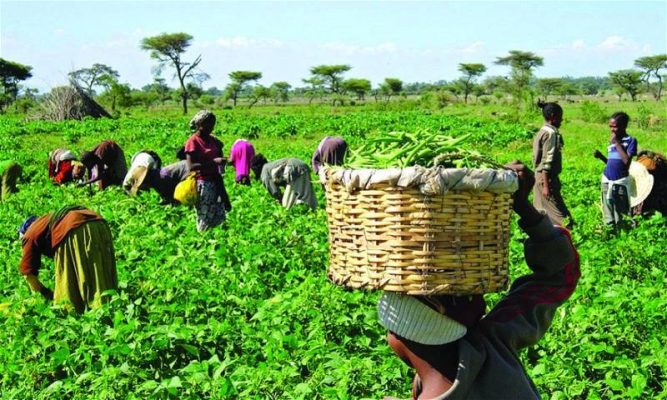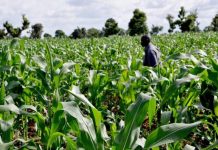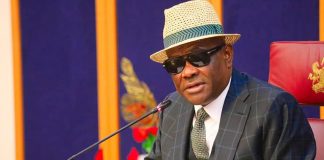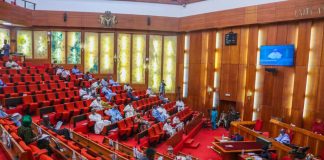🌿 Ruzu Non-Alcoholic Herbal Bitters
Ruzu Non-Alcoholic Herbal Bitters is a natural health supplement specially formulated to:
- ✅ Promote general wellness
- ✅ Detoxify the body
- ✅ Support the treatment of various ailments
Made from a powerful blend of 100% organic and medicinal herbs, Ruzu is completely alcohol-free, making it ideal for:
- 👪 All age groups
- 🌱 Health-conscious individuals
- 🌿 Anyone seeking non-alcoholic herbal remedies
Whether you're looking to boost your vitality, cleanse your system, or support healing the natural way, Ruzu Bitters offers a trusted herbal solution.
The argument that agriculture should be reframed as the primary source of both food security and economic independence has gained momentum as Nigeria considers its path toward growth and self-reliance.
Experts concur that Nigeria’s path to full sovereignty won’t be finished until agriculture serves as the catalyst for economic freedom, 65 years after political independence.
From irrigation and mechanization to value-chain industrialization and policy change, they contended that the country’s exports, processing, and growth will determine its next stage of development.
In separate interviews, experts stated that the next stage of the nation’s development needs to move beyond policy rhetoric and take bold action, positioning agriculture as a business that can secure the nation and create prosperity.
According to Adebowale Onafowora, MD and founder of BIC Farms Concepts, attaining food security will necessitate a concerted effort to eradicate inefficiencies.
In every major production zone, he said, the government must serve as a National Infrastructure Grid for Agriculture, concentrating on the development of cold-chain neta “derisking agents” through funding projects and agro-industrial parks with dedicated power and water access. “This is not a social program; it is a capital project,” Onafowora emphasized. —
According to him, “the single fastest way to triple yields, achieve all-year-round farming, and secure the nation against climate change” is to activate three million hectares of irrigated land throughout Nigeria.
Because it has continued to displace farmers and impair output, he believes that the government’s efforts to secure farms and alter land tenure must be coordinated with efforts to combat insecurity.
A single-window land registration platform should be put in place to make it simpler for serious commercial investors to obtain loans and land. In order to safeguard productive land and foster investor trust, address the insecurity issue head-on with decisive determination, he continued.
“The private sector must be the execution engine of agricultural transformation, while the government must create the enabling environment,” Onafowora said.
In order to drive value chain industrialization, he advised agribusinesses to transition from exporting raw commodities to producing semi-finished and finished goods for local and international markets.
“Value-addition performance must be linked to tax breaks and single-digit interest credit facilities,” he recommended.
He also noted that mechanization, human capital development, and agri-tech were important factors in production.
“More years of lost opportunities are too costly for Nigeria.” He asserted, “The road to economic independence is beneath the soil, not the sea.
Nigeria must strike a balance between indigenous knowledge and contemporary innovation, according to Oba Dokun Thompson, the creator of the International Cocoa Diplomacy (ICD) and the Oloni of Eti-Oni in Osun State.
He pointed out that although agriculture has entered a data-driven era driven by precision instruments, artificial intelligence, and sustainability standards, the nation must be cautious not to cede its sovereignty to foreign technologies.
Thompson said, “We are entering a time when agriculture may be colonized through the adoption of specific tools that will permanently lock us into arrangements that will make us lose our independence to achieve food security.”
Nigeria’s inherent biodiversity and organic products, which fetch premium prices worldwide for their health and environmental advantages, might provide high-value outcomes through regenerative traditional agriculture practices, he suggested.
He asserts that unrealized potential in climate funds, green bonds, and agricultural insurance can assist in releasing capital for farmers.
“Business entities should view their involvement in supporting agricultural research institutes as an investment with a quantifiable return on investment, rather than merely a corporate social responsibility gesture,” he stated.
Oba Thompson emphasized the need of cooperation while acknowledging the responsibility of the government in providing infrastructure and policies.
For highly productive and profitable years to come, he stated, “We hope to see more partnerships with not just the private sector but also the people, as the private sector usually guides the government into what is practical and feasible.”
Nigeria’s agricultural transformation, according to Dr. Abiodun Onalaja, CEO of Hyst Global Business Limited and producer of Okun Rice, will necessitate smart private sector investment near production zones and focused input distribution.
He claimed that “changing the way inputs are distributed from general subsidies to targeted vouchers would guarantee farmers genuinely gain while promoting the success of private dealers.”
Onalaja also urged the private sector to increase the number of smallholder farmers under contract, construct processing facilities near farms, and scale up digital platforms for market access and aggregation.
He pointed out that development partners might help the endeavor by implementing guarantees that reduce the risk of agricultural financing and blended finance.
Looking back on Nigeria’s agricultural history, Onalaja stated that the country’s agricultural landscape is still a tale of “what could be.”
But with the correct combination of reforms, public-private cooperation, and climate-smart investments, he said, the sector could become the cornerstone of true independence.
It is not unrealistic to see a Nigeria that produces its own food, generates millions of agro-industrial employment, and exports completed goods rather than unprocessed agricultural products. One has an option. Nigeria’s independence’s future will be etched in the soil, not in oil.
Agribusiness strategist Dr. Olukayode Oyeleye emphasized that Nigeria’s expanding population, which is currently over 200 million, necessitates an agricultural system that can produce food in significant amounts throughout the nation’s many agro-ecological zones.
Increased production of root crops, tubers, various grains, perishables, spices, livestock, and fish should receive more focus.
Nigeria’s food needs cannot be met by smallholder farming alone, he said.
To guarantee large-scale output, he continued, “the government must intentionally collaborate with and provide incentives to private sector commercial farmers.”
In order to stabilize supply and prices, Oyeleye called on the government to improve post-harvest management and extend the shelf life of perishables.
In order to guarantee the successful execution of agricultural programs, he also urged political unity and convergence across party lines.
“Generational transition is now evident. The younger generation is the one that will continue the farming industry, so the government must take them into consideration. He emphasized the need for finance and insurance packages specifically designed for farmers, saying, “These young people must be the focus of strong and robust policies.”
Free market operations have already started to benefit farmers and the economy, according to Henry Olatujoye, a former National President of the National Palm Produce Association of Nigeria (NPPAN).
He maintained that the government’s present free-market policies have improved local production, stabilized prices, and lessened reliance on imports.
He said that farmers get paid more for their labor when supply and demand are allowed to decide prices.
Olatujoye said that although commodities prices skyrocketed in 2024, they have now leveled off, with rice falling from N100,000 to N55,000 and garri from N1,400 to N515 per measure in 2025.
“This demonstrates the effectiveness of the government’s policy of permitting a free market to function,” he stated.
Additionally, he gave the policy credit for strengthening Nigeria’s foreign exchange situation. Because it is no longer desirable to import consumer goods, the dollar has dropped by over N45 in a single month. He stated that the increased GDP contribution from the non-oil sector is an indication that the economy is headed in the right way and that people are now deterred from importing what may be produced locally.
“We will achieve independence in food and economic security if we continue in this direction,” Olatujoye said.
















